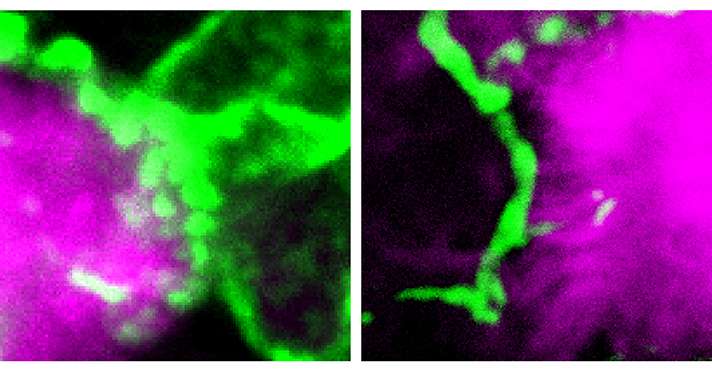Immune cells may protect against Alzheimer's

Clusters of immune cells in the brain previously associated with Alzheimer's actually protect against the disease by containing the spread of damaging amyloid plaques, a new Yale University School of Medicine study shows.
The findings, published online May 18 in the journal Neuron, are further evidence that inflammation byproducts of these immune cells are probably not a major culprit in Alzheimer's, as previously suspected, said the researchers.
"It suggests we should be enhancing the function of these immune cells, not trying to suppress it," said Jaime Grutzendler, associate professor of neurology and neuroscience and senior author of the study.
Large numbers of immune system cells called microglia are found around amyloid plaques, which are the hallmark of Alzheimer's disease. Some theorized that the toxins released by microglia trying to attack the plaques contributed to damage in surrounding brain cells.
Using a mouse model of Alzheimer's, Grutzendler and lead authors Peng Yuan and Carlo Condello studied a rare genetic mutation of the gene TREM2 that blocks ability of microglia to respond to threats to the brain. They found that plaques in mice with this mutation were covered with spiky fibers projecting outward in the brain. TREM2 and its human equivalent, which in mutated form increases risk of Alzheimer's, appear to be crucial to allowing microglia to corral and contain amyloid plaques, thereby limiting their damage, said the scientists.
"The cells act as a physical barrier that prevents outward expansion of plaques and, therefore, makes them less toxic to the connections between surrounding brain cells," Grutzendler said.
Differences in the ability of microglia to corral plaques may help explain why some individuals with large amount of amyloid plaques never develop the cognitive deficits associated with Alzheimer's. Instead, in other individuals, the process of aging may make microglia ineffective at containing these plaques, thereby contributing to loss of memory and cognitive abilities characteristic of Alzheimer's, Grutzendler suggests.




















